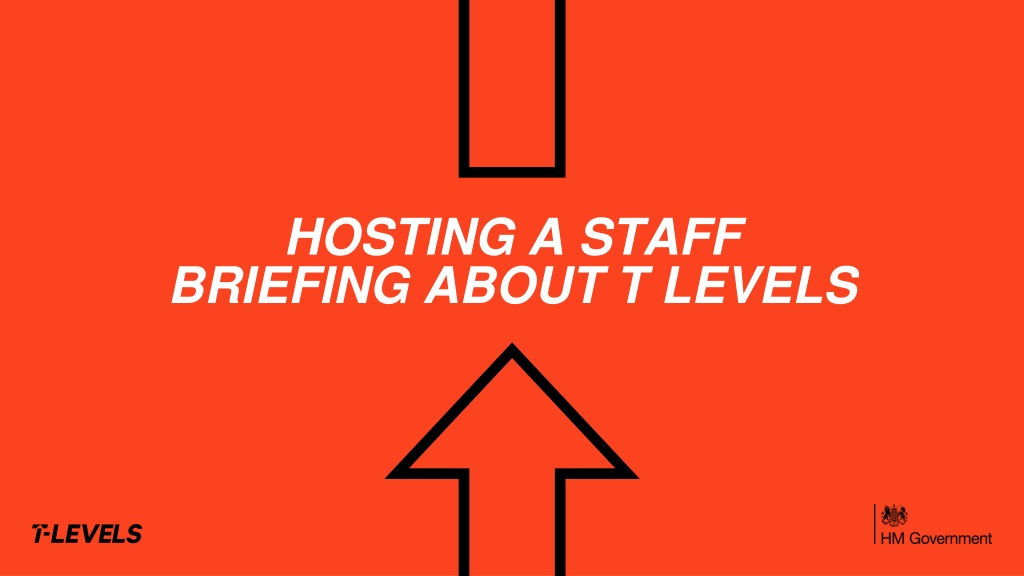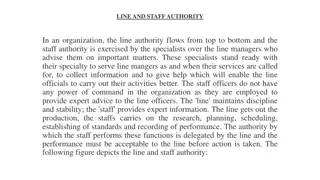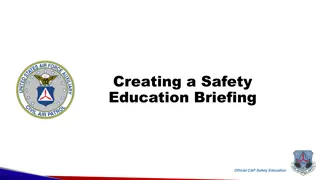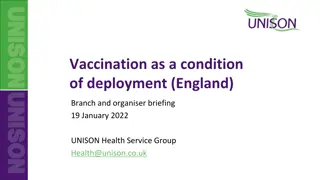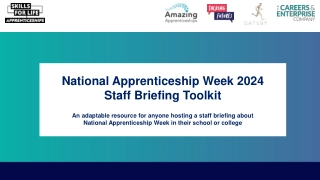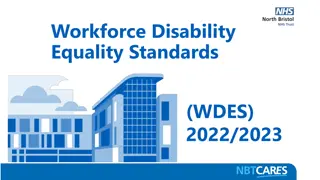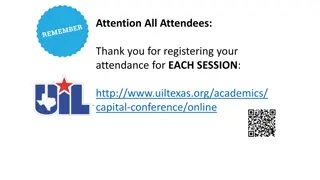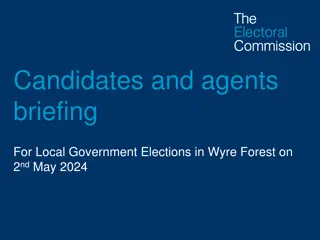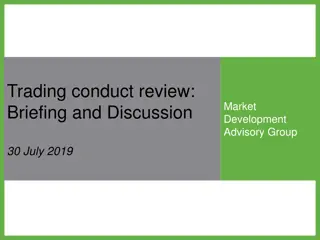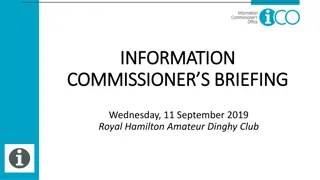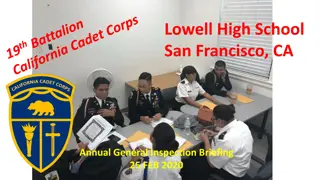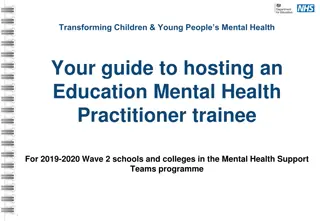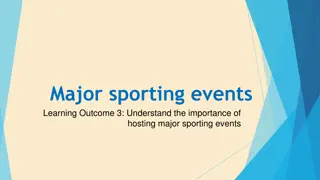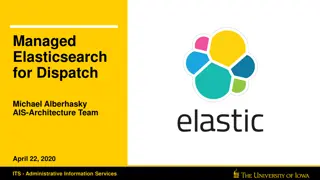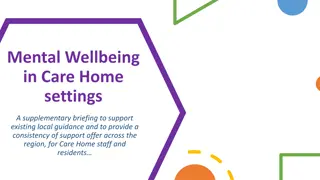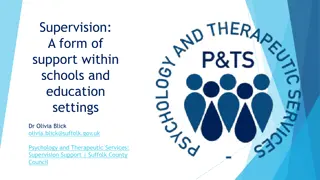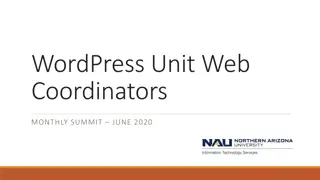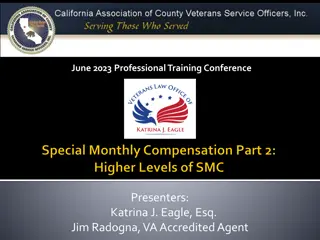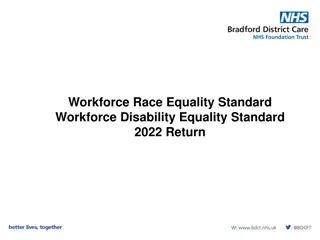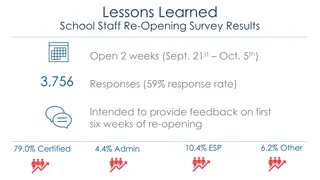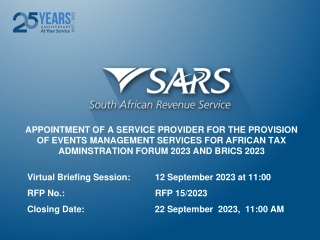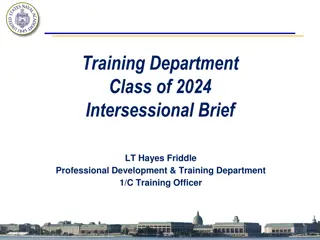Hosting a Staff Briefing About T Levels
This slide deck, designed by the DfE T Levels Team, is a resource for schools/colleges conducting a staff briefing on T Levels. It aims to generate interest and positivity among staff about T Levels, providing a customizable presentation that can be delivered in 20-30 minutes. The deck includes notes for the presenter, guidance on updating slides, incorporating videos, addressing qualification overlaps, complying with Provider Access Legislation, and identifying local T Level providers. A group task encourages discussing T Levels knowledge.
Download Presentation

Please find below an Image/Link to download the presentation.
The content on the website is provided AS IS for your information and personal use only. It may not be sold, licensed, or shared on other websites without obtaining consent from the author. Download presentation by click this link. If you encounter any issues during the download, it is possible that the publisher has removed the file from their server.
E N D
Presentation Transcript
HOSTING A STAFF BRIEFING ABOUT T LEVELS
Notes to the presenter 1/4 This slide deck is brought to you by the DfE T Levels Team. This resource is designed for schools/colleges who are running a staff briefing about T Levels and should take around 20 to 30 minutes to deliver. It can be quickly adapted for your setting, with the aim of generating interest, enthusiasm and positivity about T Levels among staff. Please delete this slide before presenting
Notes to the presenter 2/4 Please read the slides and update all sections highlighted in yellow with details for your school or college. Decide whether you want to do the task (optional) slide 7. Slides 9, 20, 21, 22 and 29 contain videos (optional) Please decide which of these you would like to use and check they can be played from the presentation. Slide 10 summarises the key facts that are shared in the video. You could show either or both, or also print slide 10 as a handout for staff to take away. Please delete this slide before presenting
Notes to the presenter 3/4 On slide 13 decide whether you want to include any qualifications you are no longer running or will be phasing out. You can find out here which defunded qualifications overlap with T Levels: Qualifications that overlap with T Levels - GOV.UK (www.gov.uk) Complete slide 14 which says what you are doing to comply with new Provider Access Legislation (PAL). Find out if your school / college will be offering T Levels and your Senior Leadership Team (SLT) response if not and complete slide 15. Please delete this slide before presenting
Notes to the presenter 4/4 Find out which providers local to you are offering T Levels and complete slide 16. https://www.tlevels.gov.uk/students/find If you search for T Level providers and the closest ones are still too far away to be a viable option for this year, it is very likely that your local providers will start offering T Levels in the coming years. Check the T Level providers list Slide 28 may need to be updated with more accurate dates. Delete school / college as applicable. Please delete this slide before presenting
Put your school logo here T LEVELS THE NEXT LEVEL QUALIFICATION A CAREER-FOCUSSED ALTERNATIVE TO A LEVELS
GROUP TASK Spend two minutes talking to someone else about anything you know about T Levels: Have you heard of them? Do you know any of the T Level subjects? How would you rate your knowledge on a scale of 1-5?
What were covering today Key facts about T Levels Why is it important you know about T Levels? Provider Access Legislation How to talk to students about T Levels Who is offering T Levels in our area Who T Levels are suitable for Where T Levels lead How to find out more
Key facts about T Levels 1. Two-year technical course that follows GCSEs 2. 80% time in learning environment (school/college/training provider), 20% spent on industry placement (with an employer) 3. Equivalent in size to 3 A levels 4. Designed to get students work ready 5. Designed with employers 6. A T Level attracts UCAS tariff points 7. Each T Level begins with core theory, concepts and skills relating to an industry or skill area and students will then be able to choose one or more occupational specialism(s). 8. On passing, students receive a nationally recognised certificate showing the overall grade achieved - pass, merit, distinction or distinction* and details of what was learned on the course.
Current T Level subjects Management and Administration New subjects coming in Sept 2023: Accounting Finance Building Services Engineering for Construction Design, Surveying and Planning for Construction Onsite Construction Animal Care and Management (Sept 2024) Catering Craft and Design Hairdressing, Barbering and Beauty Therapy Marketing (Sept 2025) Media, Broadcast and Production Legal Services Agriculture, Land Management and Production Design and Development for Engineering and Manufacturing Maintenance, Installation and Repair for Engineering and Manufacturing Engineering, Manufacturing, Processing and Control Digital Business Services Digital Production, Design and Development Digital Support Services Education and Childcare Health Healthcare Science Science
Why is it important you know about T Levels? Students and parents seek our advice all the time and we know giving the right information is really important. It the right thing to do to ensure that our students understand all of the options available to them post-16, even if it would mean them leaving our school / college. It is also a legal requirement that all students should receive access to high-quality, impartial information about all of their options, and this now includes T Levels. Ofsted will always report where a school falls short of the requirements of providing information about technical options. T Levels are a really exciting and valuable option that, in time, will become a mainstream offer for young people. Telling our students about T Levels could change their lives!
Are T Levels replacing current technical quals? There are some qualifications that will have 16 to 19 funding withdrawn for new starts from 1 August 2024, some of which overlap with T Levels. This means that from XXXX we will no longer be running: [Please update this slide, or remove it as applicable to your school / college]
New Provider Access Legislation What is our school/college doing? From January 2023, all students from years 8-13 must have meaningful encounters with providers of technical education and apprenticeships, so they can be better informed about their options, including T Levels. We are More information about the new requirements can be found here: www.careersandenterprise.co.uk/fe-skills/provider-access-legislation
Our school / college and T Levels We are offering T Levels in ________, which will be taught by _____________. OR We are not offering T Levels yet because (enter SLT response here)
What to do if a student asks you about T Levels Be impartial, but positive. Explain what you know about T Levels. Direct them to our Careers Leader. Direct them to https://www.tlevels.gov.uk/students Tell them if your school / college offer T Levels or which ones locally are. If you don t know, tell them they can look here: https://www.tlevels.gov.uk/students/find or even better, look with them.
Which schools / colleges locally offer T Levels? Before using this resource, go on to https://www.tlevels.gov.uk/students/find , put in your school postcode and find out which schools / colleges local to you are offering T Levels and which courses. e.g. XXX College: T Level Transition programme Management and Administration Accounting Finance XXX University Design and Development for Engineering Engineering, Manufacturing, Processing and Control
Which students are most suited to T Levels? T Levels will suit our students who: Know the industry or broad area of work they want to pursue for a career. Would like to focus on one broad subject area, rather than 3 A level subjects or other technical qualifications, e.g. BTECs. Like the idea of a predominantly learning environment based course, but with a strong practical emphasis and time spent with an employer on the substantial industry placement. It is important to consider: A T Level is equivalent in size to 3 A levels so students need to recognise the amount and rigour of learning involved. Feedback from the first cohort of students has been positive, they have particularly valued their time spent on the industry placement. Some T Levels, e.g. Engineering and Manufacturing, require a good level of maths knowledge. If offered by the provider, consider whether the student may benefit from the T Level Transition Programme first (see next slide)
T Level transition programme What if a student would like to do a T Level, but needs more time to get ready? The T Level Transition Programme is a 1-year post-GCSE course designed to prepare you for your chosen T Level. It gives knowledge, practical and study skills, and work experience to prepare students to excel in their chosen subject.
Where do T Levels lead? T Levels are designed by employers so are perfect for entry straight into skilled employment. A T Level is worth the same UCAS tariff points as 3 A levels. Students can use UCAS points to apply to university or another type of higher education. There is a list of Higher Education Institutions that have confirmed they are accepting T Levels as part of their entry requirements. They can also use their T Level to do a related higher level apprenticeship in some cases students may be able to access accelerated apprenticeships where prior learning is taken into account. The Institute for Apprenticeships and Technical Education has published progression profiles to help you understand the different progression routes from T Levels, at T Level progression profiles / Institute for Apprenticeships and Technical Education
Where do T Levels lead? Construction students: Alex Long (York College) is doing a degree apprenticeship at TRU East Coast Matthew Short (Truro and Penwith) is doing Building Surveying at Bristol University Charlie Bruce (Havant and South Downs) is employed as an Assistant Project Manager at his IP Peter Marsh Consultancy
Where do T Levels lead? Digital students: Leah Duckworth (Runshaw College) is doing a degree apprenticeship at her IP Shechinah Ashmead (La Retraite) is studying Cybersecurity at Coventry University Tom Stray (Fareham) is doing a degree apprenticeship at CTECH Business Solutions
Where do T Levels lead? Education and Childcare: Romilly Horner (Thorpe St Andrews) is a teaching assistant at Charles Darwin Primary School, Norwich. Ellie Hearn (Thorpe St Andrews) is doing Primary Education with QTS at Brighton University. Olivia Penny (Strode College) is studying for a degree in Early Development at Norland College
How can I find out more? T Levels Teachers Pack Termly free webinars T Levels YouTube
Celebrating T Levels The 10th 14th October 2022 marked the first national T Levels week. It was an exciting week celebrating the success of students, teachers, providers and employers. Look out for T Levels Day during National Apprenticeship Week (6th 12th February 2023)
